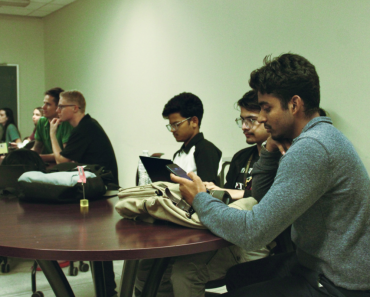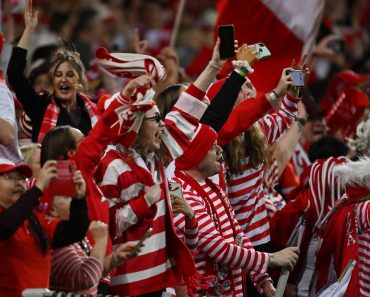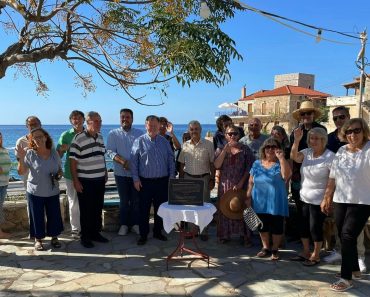It was a difficult period for women in the late 1960s and the early 1970s in the context of the Greek Community of Melbourne which was then totally ruled by men in grey suits and the Greek Orthodox Archdiocese of Australia of men only. It was a difficult period for women and more so for Greek women. Women today still encounter problems.
On International Woman’s Day 2024 I was interviewed by students of my Alma Mater MacRobertson Girls’ High School on Live FM called ‘Be Like Her Macrob’ where highly talented students at this elite public high school stepped into the world of professional broadcasting interviewing a group of inspiring past students. I was one of those students.
The first question took me by surprise. “As part of the Class of ’65, did you experience any prejudice in the law by reason of being a woman”? I decided to answer this honestly and said “No, not in the law and that the only prejudice I had experienced was in my own Greek Community.”
The late 1960s were challenging for women – particularly Greek women
The history of the AGWS has its origins in the introduction of the Modern Greek language at the University of Melbourne. The first history of the Society was written by Dr Moraitis in 1977 and entitled “A Potty Version of the History of Australian Greek Welfare Society July 1977.
Dr Moraitis writes: “A young, lively, active law student who responded to the name of Eugenia Mitrakas began to work and push for the establishment of the Chair of Modern Greek, and by 1971 she had made the Society aware of the need. Her activities by the way things go, were forgotten by 1972. Lest We Forget!”.
In 1992 the late Chris Mouroukis a journalist with Neos Kosmos provided me with copies of his personal documents in relation to the fund raising for the Modern Greek language to replace copies destroyed by me in 1973. The events that lead to me destroying my documents is a dark chapter in my life that still haunt me more than 50 years later. I will explain why later in my presentation.
The introduction of the Modern Greek language at the University of Melbourne in 1969 is an important part of the history of the Greek community of Melbourne – it united Greeks in a common cause and exhibited our national pride in our identity. These events demonstrate the enormous strength in unity. These events are pivotal to the early history of the AGWS. I believe that this history has omissions and is flawed and should be correctly documented correctly.
Mike Zafiropoulos wrote on Facebook on 1 May 2024 in the context of an extensive article that I wrote and was published in Neos Kosmos on the same day on Remembering Lemnos: “Unfortunately, we do not give adequate weight to assessing accurately the significant contribution members of our community have made, particularly of earlier generations, and thus our history in the diaspora will be passed on with distortions and omissions. There is time for documenting more accurately individual and group contributions that have influenced positively our settlement in our adopted land. It is a priority that needs to be taken by the relevant organisations”.
The Greek Community and the Society owe our community a legal and moral obligation to accurately record our history in relation to our Modern Greek language, and its role in the founding of the Society.
The Greek Club at the University of Melbourne was founded by the Hantzis brothers George and Theo in 1968. Theo Hantzis was the first President and John Petrakis the Vice President. I was elected the first Secretary.
A young woman activist is born
In 1969, when I was a fourth year law -arts student I became concerned at the discrimination suffered by our Greek community in not having our Modern Greek language taught at Victorian universities and in high schools. I believed that it was our human right to have our language taught in high schools and Victorian universities. Our Greek language together with our Greek Orthodox religion are part of our history and our culture.
In 1969 I initiated and pursued my όραμα in Greek, for the teaching of our Modern Greek language at Victorian universities and high schools. An attempt by The Federation of Greek Communities of Melbourne in 1958 did not go beyond writing a letter to the Vice Chancellor Professor Derham.
In 1969 I convened two meetings at the University of Melbourne with about 30- 40 attendees at each meeting.
My first meeting was in May 1969. Invited guests included members of parliament, academic staff from Melbourne and Monash, the Greek press, prominent members of the Greek community, my father’s Greek solicitor George Kouvaras and my mother’s Greek doctor Spiro Moraitis plus my local member at the time The Hon. Frank Crean.
The purpose of this meeting was to gauge the interest of both the university and the Greek community. At the time the Greek language was only taught in classrooms of primary schools and old churches, which pupils attended after school hours. Those classes did not form part of the school curriculum.
I studied both French and German at MacRobertson Girls’ High School and felt disadvantaged that I could not study our Modern Greek language, even though Melbourne was at the time the largest Greek community outside of Greece. This was despite the huge influx of post war Greek migrants in Melbourne. I was one of those migrants who arrived on a migrant ship in the 1950s when I was almost nine years old.
I majored in Classical Greek in my Arts degree because Modern Greek was not offered and yet, there were only a handful of French citizens and there was a whole French Department at the University of Melbourne dedicated to their language, history and culture. What about our history, our culture, our language!

In the beginning there was Dr Tsounis
The mood of the meeting was positive and those present moved a motion for me to carry out a feasibility study which I did in the ensuing months. The feasibility study involved writing to the Vice Chancellor Professor David Derham, the Vice Principal Mr Marginson of the University of Melbourne, Dr Michael Tsounis from the University of Adelaide, and having multiple meetings with university stakeholders and Heads of other language departments. I recognised the power of the Greek press.
Dr Tsounis was, to quote Fotis Kapetopoulos in a Eulogy published in Neos Kosmos on November 16, 2012 “a brilliant historian, a community leader and above all a humanist”.
I had the privilege of first meeting Dr Tsounis in 1968 and when he visited The University of Melbourne to deliver talks to the newly founded Greek Club. In his first handwritten letter sent to me in May 1969 Dr Tsounis describes my Vision as: “Necessary, timely and noble”. He added,
“I’ll certainly support it. But beware! Avoid as you would the devil in drawing the Greek community politicians onto your committee. The state of present Greek community politics will wreck your efforts. Therefore, make sure you get Australian academics in your fund-raising committee “.
My response to Tsounis explaining the proposed scope of any committee dispelled his fears and in his second letter he writes:
“Any doubts I had about the whole scheme are now dispelled and I wish to congratulate you on the way you have approached the whole question of Modern Greek”,
Fotis writes further about Dr Tsounis:
“While there are many migrants, millions of Italians, Irish, British and others, there are only four Diasporas, the Jewish, the Greek, the Indian and the Chinese: For Dr Tsounis, these Diasporas’ notion of state was based on their collective understanding of their cultural, linguistic and (to a degree) religious affiliation”.
Following the first meeting held in May 1969 I wasted no time and wrote to the Vice Chancellor of the University Melbourne, Professor David Derham.
The opening paragraph of my letter rather naively reads as follows: “I am a fourth year Law/Arts student, and Secretary of the Greek Club anxious in seeing the establishment of a Chair of Modern Greek. I am well aware of the amount of money that is required and have made plans for the launching of an appeal on a grand scale, centred around the Greek Community to raise the funds required”.
The boldness of youth and Professor Derham’s reply
My boldness can perhaps be excused by my youth and my “grand scale” was coined long before Franco Cozzo coined his “grand sale”. I articulated the questions raised at the May 1969 meeting:
If the amount was raised, is there a guarantee by the university that the money would be used for this purpose? Could the money come in as university funds but be especially reserved for the purpose? If an amount were raised short of this target, what would happen to this amount?
Where would the Chair be established, Melbourne or Monash? Professor Derham’s opening comments were:
“I am made a little anxious by what you write. I wonder if you really are aware of the amount of money required to support the establishment of a Chair?”. I was aware of the amount but, following his reply, I quickly amended the target to a Lectureship which was then $200,000.
Despite his words of caution, I think that Professor Derham was pleasantly distracted from the sit-ins and anti-Vietnam War moratoriums that were taking place at the time. Mine was a more peaceful preoccupation for him.
I was encouraged by the tenor of his reply. He copied his reply to the Vice Chancellors at both Monash and Latrobe Universities and to the Victorian Universities Committee.

Professor Derham also added: “Some time ago I was approached with a similar request. I am enclosing the reply which I made then for your information”. The addressee and date were not disclosed”.
The University of Melbourne released the complete letter to me in a large volume of documents of John Martyn in June this year.
The letter was addressed to Mr Elefantis, President of the Federation of Greek Orthodox Communities dated June 1958. This was eleven years before my letter to the Vice Chancellor.
In his reply to Mr Elefantis Professor Derham added: “I think that for your purposes, it would be satisfactory to aim at a Lectureship since the capital cost for endowing a Chair would be of the Order of $500,000. A Lectureship, if established, could be fitted into the structure of the Department of Classical Studies and would be adequate for the development of the study of Modern Greek while at the same time it would strengthen our existing department. In any case, while the University has a high appreciation of the importance of Modern Greek, there are so many other disciplines whose claims for a Chair have already been placed in order of priority, that I doubt if the University Council would be able to alter its priorities for some years. But with the Lectureship, it would be a different matter”.
The last paragraph states:
“The University Council would be keen to know, if a definite proposal were made, that it had the united support of the Greek community”.
Professor Derham’s response was music to my ears, I turned my attention to launching an appeal for $200,000 for a Lectureship rather than a Chair and I set about getting the united support of the Greek community to a Lectureship.
There was a flurry of activity, and my notes show that Professor Derham rang me at 5.30 pm on Wednesday 28 May 1969 to offer advice on how to approach the fundraising, mentoring a young student along the way.
I contacted the Greek Consul Mr Lyberopoulos, the Greek Bishop of Melbourne His Grace Bishop Aristarchos, the Greek press, the Greek Orthodox Community of Melbourne, prominent members of the Greek community. I got all stakeholders together.
My handwritten notes released by the National Library state that I also got the critical support of all the other language departments. My notes record a telephone conversation with Professor Symon Head of the Modern Languages Department on 26 June 1969 who rang me at 8.45 pm where he described my vision as “splendid “and that they were “anxious and excited about it”.
Eugenia is a Busy Girl
I was a busy girl, and The Sun newspaper agreed with this undated article published in the Sun at the time under the headline Eugenia is a Busy Girl. I was then 21 years old.
I convened a second meeting in July 1969. I invited the academic staff of the Classics Department, Frank Crean and senator Georges from Queensland who made the trip down under from Brisbane. I gained the united support of not only of the Greek community of Melbourne, but the support of a Queensland Senator and a Greek South Australian academic. I had a united national Greek support for our common cause.
This unity is evidence of how much we can succeed as a community if we are united. The world is our oyster, but only with unity.
I tabled both letters from the University of Melbourne and the two letters sent to me by Dr Tsounis and referred to my multiple pages of my handwritten notes made in May and June of 1969.
These letters together with my notes were lost after this meeting and found their way into the National Library in Canberra. I am grateful that they survived my bonfire of 1973 but still wonder how they got there.
Reading my notes and the correspondence, I am quite amazed at the magnitude of what I had achieved as a young student. I had my own vivid memories and recollections, but, as Her Majesty Queen Elizabeth II famously said, “recollections may vary”. These documents are evidence of the events leading to the introduction of the Modern Greek language and do not rely on recollections that may vary.
I was overcome by emotion but managed to hide my emotions. Here I was chairing a meeting in front of our Consul, eminent academics, Federal politicians, members of the Greek community, the Greek press. How did I do it?
The Vice Chancellor became aware that I had the full support of the Greek community as Professor Hunt reported to him.
In 1969 Pyrsos published an article under the heading, ‘Chair of Modern Greek at university’.
“A meeting took place a few days ago at the University of Melbourne on the initiative of Miss Mitrakas, Secretary of the Greek Club, in the presence of the Consul for Greece, in Melbourne, Mr Lyberopoulos and many other distinguished guests, including academics from the Classics Department and Professor Hunt, representing the University to debate the introduction of Modern Greek at the University of Melbourne”.
Vivienne Morris interviewed me in 1970 in the Pyrsos Newspaper under the heading, ‘Our Search – Eugenia Mitrakas’.

Vivienne starts with one of my quotes; “When you want something badly, you try to succeed with all your strength. If you fail, you are at least at peace with yourself. If, however, you do not try how can you say that this is not possible?” Vivienne was interviewing me on the progress of the Appeal, but I could not disclose much at that point until an official announcement was made.
In 1970 I joined forces with Mr John Martyn one of my lecturers in Classical Greek at the University of Melbourne. A two-day inaugural interstate conference was held at the Savoy Hotel in Melbourne on 15 and 16 August 1970 to examine ways and means of establishing Modern Greek as an academic subject in both secondary and tertiary levels.
I was invited to this conference as a student representative. Two committees were elected at this conference, one being the Academic Committee responsible for the curriculum and a Support Committee responsible for the fundraising.
Mr Lyberopoulos and His Grace Bishop Aristarchos were elected in their absence. The Support Committee was under the Aegis of the University of Melbourne Headed by Sir Robert Menzies and was the Peak fundraising Committee.
An email sent to me by John Burke on 16 August 2024 one of my Classics Tutors reads as follows: “…the Savoy Conference of 15-16 August. The minutes note that you were elected to the Support Committee, along with (sic) Elephantis, Gogos, Kouris, Scrinis, all of them big names in the Greek community for many years. What chance did you have in such company, a young θυλικό πράμα? (That’s a phrase used by other καπιτανέοι in a 1960 Aliki Vouyouklaki movie called Mandalena, where the young woman helms her father’s kaiki in order to look after her six siblings after her father dies). Kapitaneoi, grey suits, το ίδιο πράγμα”.
Roger Scott one of my Classics lecturers was also present at this Conference and is present tonight. I thank him for his support spanning over more than 55 years. The Support Committee met for the first time on 14 September 1970. The Minutes of that meeting record that Mr Martyn moved a motion that I convene a subgroup of solicitors and doctors to act as a separate fundraising committee.
The Consul Mr Lyberopoulos convened a Youth Committee, and I was invited to serve on this Committee.
Sir Robert Menzies agreed to be the Patron of the Support Committee. This was a real coup for the Appeal but logical as he was then the Chancellor of the University of Melbourne.
The Support Committee approved a letter for circulation with a brochure. The letterhead carries the logo letterhead of the University of Melbourne and lists the following in this Order: Sir Robert Menzies – Patron; His Grace Bishop Aristrachos, The Consul for Greece Mr Lyberopolos and Professor Hunt Head of Classical Studies as the three support Patrons; Mr John Martyn as the President.
All the men in grey suits of the Greek community
The members of the Support Committee included all the men in grey suits of the Greek community plus my tutor in Classical Studies James McCaughey who is present with us tonight. I was the only female and student. I believe that the two of us are the only living members of the Support Committee. I thank James for his support during the fundraising and for his support decades later in presenting a paper on our Cultural Day at one of my Legal and Medical Conferences in Greece.
The Appeal was launched on 27 October 1970, known as OXI Day, or No Day being the day the Greek Nation said No to Mussolini and joined World War II. Chris Mouroukis, an alternate on the Support Committee for Gogos promised a full page to spread in Neos Kosmos and he delivered.
The names of the Committee were published in Neos Kosmos on 27 October 1970 and my name appeared on the front page together with the men in grey suits. My father was proud.
His Grace Bishop Aristarchos convened a committee of older members of the Greek community who joined in the fundraising. The different brotherhoods and clubs also joined in the action.
The whole Greek community was involved in holding multiple fundraising events which included screenings of Greek movies, dinner dances, Hellas Soccer friendly matches, walkathons, picnics, door knocks, raffles. It was all happening. I have not seen such unity in our community before or in my lifetime as our combined national pride and identity as well as our Greek language were centre stage.
The Greek Consul Mr Lyberopolos was first to hold a cocktail reception in November 1970 at the Top of the Town Restaurant in Collins Street. I received an invitation and attended. I was the only student present.
By the end of 1970, I found myself serving on the main Support Committee under the Aegis of University of Melbourne, the Consul’s Youth Committee and on the committee of solicitors and doctors that I had convened. I was then 22 years of age and still a student.
I commenced my Articles of Clerkship in 1971 with George Kouvaras who together with his associate Dennis Gabriel assisted me in preparing the list of solicitors and doctors. I was also enrolled in 4 Articled Clerk subjects and attended early morning and late afternoon lectures.
In 1971 the committee of solicitors and doctors became known as the Greek Professionals Association known as the GPA. Kouvaras was elected the first President of the GPA, and I was elected the first Secretary.
A formal fundraising dinner dance was held on 7 July 1971 at the Southern Cross Hotel with Sir Rupert Hamer as the guest speaker. Sam Papasavas and I were the ticket secretaries. By the end of 1971 the GPA had become a lobby group for the Greek community, lobbying for the rights of Greek workers and championing their causes.
I was admitted to practice on 1 March 1972 and The Sun newspaper was there to record the event probably because I was the only female in my admission ceremony in the Supreme Court of Victoria. I did not do anything special to attract the attention of the mainstream media, other than the fact that I was an energetic young first-generation Greek female migrant in a male dominated profession.
The Sun reports my ambition to support the “downtrodden” and by that I meant women and migrants. I championed both in a male dominated profession.
The GPA was first photographed at the home of Kouvaras in the first half of 1972. This photograph was used several times by the Greek press when reporting about the activities of the GPA. Only four members of the GPA became founding members of the Society namely George Papadopoulos pictured standing on the left, Spiro Moraitis next to him, Conn Constantinou, pictured at the end of the back row and me seated in the middle. These men plus Kouvaras discarded their grey suits for the photograph.
An article published in Neos Kosmos in the middle of 1972 is headed: The Greek Professionals Association on the side of the workers. This article confirms that the GPA was officially launched on 27 February 1972 when a group of 46 professionals in our community gathered and founded the Greek Professionals Association to examine the problems of Greek migrant workers and identifies the GPA as an independent organisation to lobby the Australian government in resolving the multiple problems of our community.
This article clearly identifies the GPA as a lobby group for Greek migrants and this explains why I failed in getting tax deductibility for the Society in the 1970s as both the State Revenue Office and the Australian Taxation Office also identified the Society as a lobby group and not a public benevolent institution and rejected our application for tax deductibility. Kouvaras is described as the President, with Zois Economou a solicitor from Greece as the Vice President and me as Secretary.
Education was also a pressing issue and had reached a fever point during this period. In an undated article, the Greek press reports on a meeting convened by the GPA to discuss the crisis faced in the public education sector in the outer suburbs of Melbourne of overcrowded classrooms where hundreds of Greek children attended school. The report details a lack of classrooms, shortage of teachers, and where drinking water taps were unhygienic and endangered the health of the children. The Federal Minister of Education Kim Beasly Snr. acknowledged the shortcomings in the public schools and promised to address the problems.
In the early 1970s there were a lot of changes in the Federation of the Greek Community of Melbourne. I have not gone into this history, but Chris Fifis has written extensively on this topic. I also thank Chris Fifis for his wise counsel in preparing my presentation.
An article headed ‘Time for change’ was published by Community Voice a newspaper of the Greek Community of Melbourne on 22 April 1973. The article uses the photo of the GPA taken a year earlier and writes about the period of change in the Greek Community of Melbourne when Elefantis lost the election and Scrinis was elected President heralding a “Time for Change”.
The caption under the photograph describes the efforts of the GPA, who had formed their own Association to help solve the problems faced by our community and identifies the members of the GPA in this order; (sic) G Kouvaras, Z Economou, Constantinou, Papadopoulos, Moraitis, M Economou, Miss Mitrakas and others.
The article identifies the GPA as an exemplar organisation with ability to solve the problems of the Greek community and calls for unity in our community. The GPA held several meetings during 1972 to debate future action. The idea of forming the Australian Greek Welfare Society was discussed several times at these meetings.
The Society was founded on 15 August 1972. The name of the Society was suggested by Sir Eugene Gorman who attended one of those meetings. Sir Eugene was an eminent lawyer and served as an Honorary Consul for Greece. He was the first true Philhellene.
Australian Greek Welfare Society was formally launched
Australian Greek Welfare Society was formally launched on 15 August 1972. The Minutes record that we seek the following: Attorney General registration – meaning Incorporation as a company limited by guarantee that then required approval by the Attorney General Haddon Storey; Seek registration under Hospitals and Charities Commission; Seek Tax Deductibility of Donations.
As a young solicitor with five months post admission experience and in solo practice I was asked to draft the Constitution of the Society and obtain tax deductibility. These were and are still senior legal tasks.
The Society resolved as follows: That it must be representative of all Greeks; It must involve all individuals, the Greek Orthodox Church, the Greek communities, clubs and brotherhoods; We expressed a hope that from a small start, with very little finance and lots of enthusiasm, the Society will grow.

And did we grow!
I was again elected first secretary of the Society with George Papadopoulos as the first President with Savas Augustakis as the first Treasurer. This was the third organisation in as many years where I was elected as the Honorary Secretary, a position I held for most of 1970s and into the early 1980s apart from two terms as Chairman. I wonder whether the role of Secretary in Greek for not profit organisations fell into the laps of women because the men saw us as inferior. It is regrettable that the name is usually associated with menial tasks of typing documents. The Secretary has an important role in the governance of a company. I recommend that charitable organisation change the name of Honorary Secretary to Chief Executive Officer.
The Society, Fronditha Care for the Aged and Hellenic Australian Chamber of Commerce known as HAACI are now led by women. I believe that it is again ‘Time for change’ in the leadership of the Greek Community of Melbourne to allow more diversity in its leadership.
The Society opened its doors on September 1, 1972 in temporary accommodation in 227 Lonsdale Street. The Society held its first general meeting on Sunday 10 December 1972. It was announced at that meeting that the Society was moving into the Greek Community Building, at the beginning of 1973 courtesy of the Cyprian Community with the support of Tony Toumbourou and Sam Papasavas.
The bottom picture identifies the executive of the Society in this order (sic) Miss Eugenia Mitrakas, Honorary Secretary, G Papadopoulos, President and Mr Nick Polites, Director of the office.
The move of the Society to the Greek Community building coincided with the time when the funds were raised for the Greek Lectureship at the University of Melbourne.
John Martyn went on sabbatical leave in 1971 which was extended to 1972. During his absence Con Nikakis, a Greek solicitor was appointed as Acting Chairman. I do not know how this came about. I was not invited to any meetings of the Support Committee during John Martyn’s absence.
Nikakis was known to me as he was a good friend of Kouvaras. I remained a friend of Nikakis during his lifetime.
I believe that there was a takeover of the Support Committee by His Grace Bishop Aristarchos during John Martyn’s leave and Nikakis was appointed Acting President as a ‘fresh face”. I have not researched this aspect any further as my history is from my personal perspective.
In a Press Release issued by the Vice Chancellor on 5 April 1973 Professor Derham announced that a Lectureship in Modern Greek was established and was made possible by gifts to the University from moneys raised by members of the Greek community and by money and books given by the Greek government.
In his press release Professor Derham says: “The Greek community has worked for many years to have the teaching of Modern Greek established in our schools and Universities.
The fundraising reached $100,000 which in 1972 was a substantial amount. Further financial support came from the University’s General Development Grant made by the Commonwealth and State governments.
One Friday night in April 1973 I was in the city enjoying late night shopping introduced by Alfredo Kouris. Kouris was the Editor of Pyrsos newspaper and was on the Support Committee. He initiated a campaign in the early 1970s to Make Melbourne Brighter which included late night shopping on Friday nights.
I ran into a friend Anna Matthews outside Myer Melbourne in Lonsdale Street, and I asked her if she was also going shopping. She replied that she was attending a function in this building for the handover of the cheque to Professor Derham the Vice Chancellor. I felt like a lightning bolt had hit me. I was not invited to this function. I rushed off crying hysterically.
I cried myself to sleep and on Saturday morning I gathered all my documents from the beginning of 1969 until that day and set them on fire. It was some bonfire. On reflection decades later, I consider this a folly of my youth but evidence of my pain in not having my hard work recognised or acknowledged.
At 8 am the following Monday morning Spiro Moraitis rang me having noticed my absence at the Friday night event and said: “Make sure you keep the documents for the Greek Chair safe as they are an important part of the history of our community”.
“Too late”, I cried. I was totally heartbroken. I initiated the concept, worked tirelessly on the feasibility study and served on three committees.
An article was published in The Record newspaper on 28 April 1973 under the heading Modern Greek to be taught at university and secondary schools. Following the publication of this article Con Nikakis rang me to complain about me taking part in the interview that resulted in the publication of the article rubbing more salt into my open wounds.
Last August I was in this very room when Dr Alexandra Dellios delivered a paper on the women activists in the Society in the 1970s and finished her paper without mentioning my name.
In an email sent to me on 18 October 2023 Dr Dellios writes:
I am sorry that my talk failed to mention you and the work you did for AGWS, and in the legal field more broadly – I suppose I have been limited by the sources I’ve consulted, and the dominant male personalities that put their names to papers about welfare matters in that period of the 1970s. I’m actually just today reading through a paper you gave in June 1976 on ‘Migrants and the Law’! I did not intentionally leave you out of my paper – I just did not have enough information, and my records are patchy. I’d like to remedy this. I want to elevate the voices of women such as yourself in the historical archives”.
Dominant male personalities
In her apology, Dr Dellios refers to the dominant male personalities who put their names forward to papers about welfare matters. In the 1970s, the male personalities of the AGWS rendered me virtually invisible. I was excluded from executive meetings, reserved for men only and all meetings with politicians.
I served on the executive for 10 years mostly as Honourary Secretary, but my name never appeared on any correspondence and no notices were sent under my name. Multiple legal submissions that I prepared were sent out under the President’s signature although the Submissions record my name as the author.
Picture yourselves in the Greek community with the men in grey suits in the late 1960s and early 1970s to be replaced in the 1970s by the men in more casual attire. The introduction of our Modern Greek language, together with the formation of the Greek Professionals’ Association, which morphed into Australian Greek Welfare Society are significant events in the history of the Greek Community of Melbourne in the late 1960s and early 1970s.
I could not have played a role in these events without the unconditional support of the Greek community at the time, who attended significant meetings organised by a young female student. The male leaders and academics of the time attended my meetings in 1969 and unconditionally supported me in my crusade. Their support was critical to the success of the outcome in having our language taught at Victorian Universities and high Schools. I feel humbled and honoured that they believed in me despite my youth and sex.
Many of the men involved during this period became lifelong friends. My greatest honour was achieved when I was invited to be the guest speaker at Spiro’s Moraitis 90th birthday celebration last year.
I believe the Greek Community of Melbourne and the Society should review their history in the wake of the landscape of the late 1960s and early 1970s mentioned above.
The formation of the GPA was a crucial milestone for our community that spearheaded the founding of the Society. The Society brought together a polarised community and became respected not only by all sectors of the Greek community but also by the politicians of both side of politics.
Malcolm Fraser in this policy speech when launching the 1977 election praised the Society for its excellence and voiced his opinion that government funds are best in the hands of ethnic minority groups who understand the needs of their community. Fraser was one of the first Federal politicians to visit AGWS as a member of the opposition in 1973.
Petro Georgiou, the Federal Member for Kooyong from 1994 to 2010 was Fraser’s senior adviser from 1975 to 1979 and a close friend and ally of the Society and I have no doubt that The Hon Malcolm Fraser was properly briefed by our Petro.







